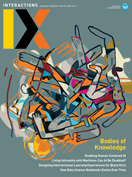Authors:
Laura Forlano, Daniela Rosner, Alex Taylor, Mikael Wiberg
How do we come to know and experience the world differently through our intimate relationships with machines, things, plants, and animals? This is a key question that design and technology scholars are asking as our field reconsiders, expands, and unsettles the boundaries between body/mind, human/machine, nature/culture, and researched/researcher. A relational understanding of the human in relation to the many things—not only computers—that make up our worlds might invite questions about the nature of our participation in issues, publics, and politics. These relationships might be affirmative and caring, abusive and dehumanizing, or negotiated through acts of resistance and refusal.
In this issue of Interactions, we engage with emerging discussions around what bodies (including posthuman and/or more than human) shape our ways of knowing. In particular, we ask: What kinds of HCI approaches and methodologies are required to make sense of these connected ways of being? What counts as data in our projects and how is it recorded and analyzed? How might art and design allow for creative knowledge-making (and unmaking) practices?
This issue considers some of the alternative forms of inquiry that make room for deeper understandings of our relationships.
As researchers, we participate physically, mentally, and emotionally in embodied relationships with all kinds of things that we study. Yet, rather than embrace those attachments, we tend to try to erase them and insist on objectivity. This issue considers some of the alternative forms of inquiry—autoethnographic accounts, first-person research, and critical making practices—that make room for deeper understandings of our relationships. These approaches destabilize knowledge in HCI by inviting and inventing alternative approaches to making sense of the world while engaging all (or many more) of the senses. Laura Forlano offers an intimate account of her relationship living with a "smart" insulin pump and sensor system to argue that we must begin to understand all computational systems as disabled. Leilani Battle, Deepthi Raghunandan, and Niklas Elmqvist look into the formation of information visualizations such as the temporalities at play in how notebooks change over time, and Oscar Tomico describes his cohabitation with plants in his apartment throughout the Covid-19 pandemic. Exploring intimate experiences of digitally mediated trust, Anuradha Reddy describes B00B-Factor Authentication, a bra-like garment that incorporates two-factor authentication with Banjara embroidery. In her online platform Unfinished Farewell, Jiabao Li makes space to connect with the intimate realities of mortalities in the midst of Covid-19. In addition, Michael Ekstrand, Maria Soledad Pera, and Katherine Landau Wright look at AI-powered systems from the viewpoint of encounters with these "knowledgeable others" that go beyond peer collaboration. Together, these and other contributions illustrate how art and design might offer opportunities for small interventions in everyday life as well as new modes of knowledge-making and questioning. These lines of thinking/being/making are vital and necessary ways of taking seriously the everyday labor of investing in relationships that require mutuality, responsibility, and care.
Laura Forlano (guest editor) Daniela Rosner, Alex Taylor, Mikael Wiberg
[email protected]
Copyright held by author
The Digital Library is published by the Association for Computing Machinery. Copyright © 2023 ACM, Inc.








Post Comment
No Comments Found